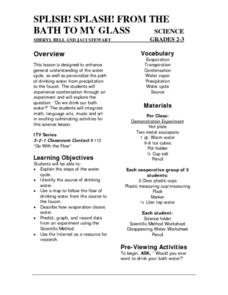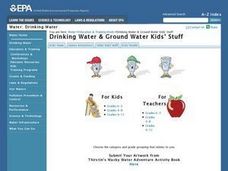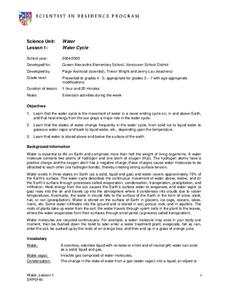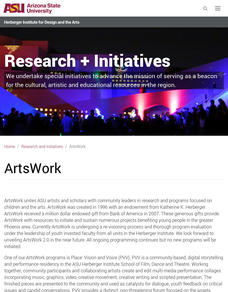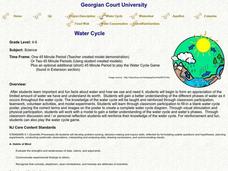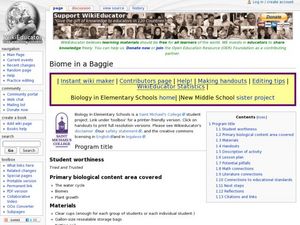Earth Day Network
Conserving Water Through Art!
Having fresh, clean drinking water is a privilege many people take for granted. Help raise awareness about the scarcity of water and the importance of conservation by discussing different ways water is used in everyday life. Brainstorm...
Curated OER
The Water Cycle: States of Water
Elementary schoolers explore states of matter by concentrating on the ways in which water moves between its solid, liquid, and gaseous states in a variety of Earth environments. Learners interpret these movements through dance. The...
Curated OER
Splish! Splash! From the Bath to my Glass
An excellent activity on the water cycle! In it, learners should gain a general understanding of the water cycle, along with how water first falls as precipitation, then ends up coming out of our faucets. This activity nicely integrates...
Curated OER
Water Cycle
In this water cycle worksheet, students draw a picture and write a short story. In this fill in the blank and essay worksheet, students complete two activities.
NASA
Freshwater Availability Classroom Activity
This science assignment produced by NASA teaches inquiring minds the distribution of Earth's water. Learners will appreciate and understand the importance of fresh water and how weather and climate affects everything.
Curated OER
The Water We Drink
Third graders relate that the quality of their drinking water is subject to the condition of the environment and water found in streams and creeks in their community. They track the travel of a wad of paper from a student's desk to a...
Curated OER
Youth Activity: How People Get Their Water Reservoirs: "Holding Tanks" for Drinking Water
Students experience and participate in "Riding the Water Cycle" with this lesson. They explore, analyze and study the role of reservoirs in maintaining a reliable supply of drinking water. Each student constructs a model of a reservoir.
Discovery Education
Smoke on the Water
How do clouds form? Learners demonstrate the formation of clouds and the water cycle by testing four different setups in a plastic bottle. They identify the key components of a cloud to help them understand the process of cloud...
Curated OER
Water Cycle
Young scientists explore Earth elements by conducting an experiment. They define water vocabulary terms such as condensation and precipitation. In addition, they conduct a water experiment in which they build a terrarium, so they can...
Curated OER
Water
Third graders study different bodies of water and how they fit into the water cycle. They explain that materials exist in different states (solid, liquid and gas) and change from one to another, that there are systems, order, and...
Curated OER
Water Cycle
Learners identify the different stages in the water cycle. In this earth science lesson, students calculate the residence time of water in oceans using a mathematical formula. They explain how this cycle regulates the Earth's climate.
Curated OER
The Water Cycle
Second graders conduct an a water cycle experiment. In this water cycle lesson, 2nd graders observe a puddle of water, they predict how it got there and what will happen to it. Students watch a demonstration on the water cycle and...
Curated OER
Water Cycle
Ninth graders explore ways water moves through various reservoirs on Earth, examine how human activities change water cycle, investigate substances present in water that indicate human activity, and discuss how understanding water cycle...
Curated OER
The Water Cycle
Fourth graders explore changes in water forms. In this water cycle lesson plan, 4th graders build a water cycle model and monitor it for 2 weeks in order to understand that water changes state as it moves through the cycle.
Curated OER
Water Cycle (Grades 2-4)
Students demonstrate their understanding of the water cycle and how it effects the environment by graphically depicting and describing the water cycle.
Curated OER
The Other Water Cycle
Middle schoolers examine human impacts on the water cycle. They compare/contrast the permeability of various materials for the purpose of engineering landscape drainage systems, and answer discussion questions.
Curated OER
Water Cycle
Third graders define and discuss evaporation, precipitation, condensation, and collection, color web pages to illustrate Water Cycle book, listen to stories about Water Cycle, play trivia game to demonstrate knowledge of what they...
Curated OER
Water Cycle
Learners explore the water cycle. In this water cycle lesson plan, students examine water as a resource as they create a water cycle poster and create a water cycle model. Water cycle game instructions are included as well.
Curated OER
Water Cycle Bag
Students enclose water in an airtight bag and leave it in a warm area to view the water cycle. In this water cycle lesson plan, students observe evaporation, condensation, and precipitation. They then discuss what they learned about the...
Curated OER
Water Cycle
Second graders investigate the water cycle. In this water cycle lesson, 2nd graders discover how the water cycle effects erosion and weathering. Students create their own terrariums to view the water cycle. Students illustrate their...
Curated OER
The Water Cycle
Students simulate the water cycle. For this water cycle lesson, students create a model of the water cycle. Students draw the water cycle and write a paragraph explaining their drawing.
Curated OER
The Sun as the Driving Force of the Water Cycle
Students study the water cycle and how the sun is an important factor. In this water cycle lesson students investigate how to desalinate water and explore the different densities of fresh versus saltwater.
Curated OER
Biomes and the water cycle
Students create a desert biome and a prairie biome and see how plants survive in both. In this biomes lesson plan, studnets create their biomes and see how the water cycle effect each biome and plant differently.
Curated OER
Water Cycle: Mobius Strip
Students describe the water cycle and create a Mobius strip model. They determine that the weathering of rocks continually adds sodium to the Earth's rivers and subsequently to the oceans. They discuss the fact that the water on Earth...




